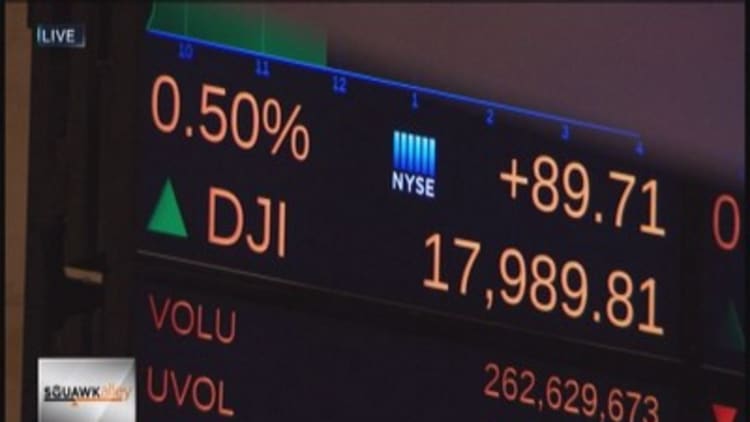
U.S. stocks rose on Friday, lifting the Dow and S&P 500 into uncharted terrain and posting a seventh week of gains, as investors embraced a stronger-than-forecast November payrolls report as backing the view the economy can handle rate hikes by the Federal Reserve in 2015.
"This is really a phenomenal day. We have the pieces of the U.S. economy coming together, with robust jobs growth, falling gas prices giving consumers lots of confidence to spend money, and low interest rates. It's a great holiday gift going into the end of the year," said Jeff Kravetz, a regional investment strategist at U.S. Bank Wealth Management in Phoenix
"We're seeing further confirmation that the U.S. economy can stand on its own two feet, that life goes on when the Fed is no longer buying assets," said Jeff Greenberg, senior economist at J.P. Morgan Private Bank.
U.S. employers created 321,000 jobs last month, the largest gain since January 2012, and topped the most cheery estimates. The unemployment rate remained unchanged at a six-year low of 5.8 percent, and hourly earnings increased 0.4 percent.
"It was a great report, there are no two ways about it. The highest estimate I had seen was 275,000," said JJ Kinahan, chief market strategist at T.D. Ameritrade.
Stock-index futures reversed direction several times in the wake of the data, and benchmark Treasury yields shot higher.
"This report is first reflected in the rates market, and impacted yields quickly, so the shock was there, and that threw the equity markets," said Greenberg.
The initial reaction in equities is the market's "futile attempt to say this means the Fed is going to move earlier, and you should see yields trending higher in an improving economy," said Art Hogan, chief market strategist at Wunderlich Securities, referring to the notion that the report could move up the timing of Fed's rate increases.
Another report Friday had orders for falling 0.7 percent in October.
Major U.S. Indexes
After a 91-point advance lifted it to a intraday record and within 9 points of the psychological milestone of 18,000, the Dow Jones Industrial Average gained 58.69 points, or 0.3 percent, to 17,958.79, with JPMorgan Chase and Goldman Sachs Group leading blue-chip gains that included 20 of 30 components.
Also climbing to a record, the advanced 3.45 points, or 0.2 percent, to 2,075.37, with financials pacing sector gains, as higher interest rates would boost bank earnings, and energy performed most poorly among its 10 major industry groups.
The Nasdaq added 11.32 points, or 0.2 percent, to 4,780.56, leaving it down 0.2 percent on the week, it first weekly drop in seven.
The CBOE Volatility Index, a measure of investor uncertainty, fell 4.4 percent to 11.84.
For every seven shares that fell, eight rose on on the New York Stock Exchange, where nearly 755 million shares traded. Composite volume approached 3.4 billion.

The yield on the 10-year Treasury note used to figure mortgage rates and other consumer loans rose 7 basis points to 2.3039 percent, and the U.S. dollar rose against the currencies of major U.S. trading partners, hitting a seven-year high against the Japanese yen.
Dollar-denominated commodities including oil and gold fell, with crude futures for January delivery falling 97 cents, or 1.5 percent, to a five-year low of $65.84 a barrel and gold futures for February dropping $17.30, or 1.4 percent, to $1,190.40 an ounce.
On Thursday, U.S. stocks fell, with benchmarks not far from record highs, as investors considered reports that the European Central Bank would consider a broad-based package of quantitative easing in January and awaited the monthly jobs report.
Read More Stocks end slightly lower ahead of payrolls report


